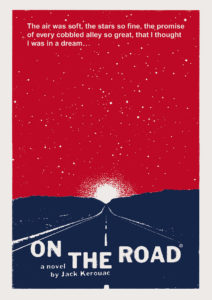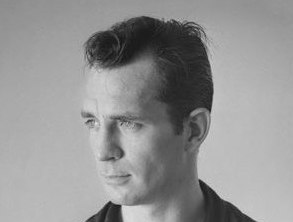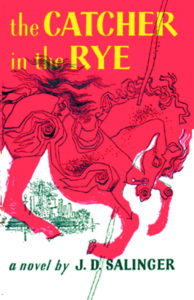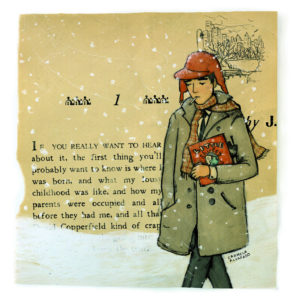“‘[T]hat is the secret to happiness and virtue—liking what you’ve got to do. All conditioning aims at that: making people like their unescapable social destiny.'”
—from Brave New World by Aldous Huxley
words to inspire before you expire
“‘[T]hat is the secret to happiness and virtue—liking what you’ve got to do. All conditioning aims at that: making people like their unescapable social destiny.'”
—from Brave New World by Aldous Huxley
 Welcome back, class.
Welcome back, class.
Jack Kerouac’s On the Road fits nicely between two other novels I’ve read for this blog: The Grapes of Wrath and The Catcher in the Rye. Kerouac’s novel has the same nonconformist, rebellious attitude as The Catcher in the Rye (with a little less teen angst), but Catcher is all in the narrator’s head. Though just like The Grapes of Wrath, On the Road has the sense of a sweeping American portrait. For its 1950s setting, it describes the entire country poetically and perceptively, which is why it makes the list.
But as good a reason as that is, I wouldn’t say On the Road was worth my time—and that’s entirely because of the story and the characters. The narrator, Sal, develops a friendship with a man named Dean Moriarty, and the story is about the many cross-country road trips they make with each other. They rarely have enough money, which never bothers them, and they find ways to enjoy the chaos of living on the open road—speeding recklessly across the landscape, sleeping around, drinking, and finding money where they can.
These two characters, with their rotating roster of friends and lovers, are always crossing the country or waiting until they can cross the country again. They can’t seem to stay in any place for long. My theory is that they are looking for happiness—something they’ve never had with the people in their lives or the jobs they’ve settled for. What they do along the way in their search doesn’t matter to them, because they aren’t happy . . . which means they can break the law, dispose of people in their lives like trash, and succumb to whatever they feel like doing at any moment.

Author Jack Kerouac
There is an appeal to their lives—they can abandon anything that ties them down, and hit the open road with more energy than anyone else. There is something impressive about their ability to relinquish everything. This is Kerouac’s connection to the Beat generation of literature—a group of artists after WWII who celebrated the beaten-down-ness and the beauty of their lives. This group found interesting ways to challenge social norms while creating new methods of art, and On the Road is one of the most powerful novels that sum up the Beat generation of artists.
But the idea of abandonment is taken too far, at least for me, by the way the characters treat others. Sal and Dean just as easily abandon the rules of kindness, and their recklessness never fails to hurt others. Their sexism and homophobia also get under my skin, even if it fits with both their lifestyle of abandonment and American society of the time. They are powerful characters, but they are incredibly unlikable.
Still, On the Road always comes back to what makes it special: a poetic voice that captures America. The road trips show off the variety of American landscapes and people—the frontier of the West, the wilderness of the East, the oppressive humidity of the behind-the-times South, the jungle of Los Angeles and the cloudy closeness of New York . . . it’s all remarkable through Sal’s eyes. I can’t to justice to Kerouac’s language, so that you’ll have to read yourself.
Up next is a novel I’ve been reading for a while, alongside the last several books I’ve posted about. I’ll probably need more than a blog post to write about James Joyce’s Ulysses, but I’ll try to keep it short! But it’s one of my favorite novels of all time, and I can hardly wait to tell you why you should read it.
Until next week,
Prof. Jeffrey
“The rainy season of the autumnal equinox was now come, and I kept the 30th of September in the same solemn manner as before, being the anniversary of my landing on the island, having now been there two years, and no more prospect of being delivered than the first day I came there . . .
It was now that I began sensibly to feel how much more happy this life I now led was, with all its miserable circumstances, than the wicked, cursed, abominable life I led all the past part of my days; and now I changed both my sorrows and my joys; my very desires altered, my affections changed their gusts, and my delights were perfectly new from what they were at my first coming, or, indeed, for the two years past.”
—from Robinson Crusoe by Daniel Defoe
[Elizabeth speaking to Lady Catherine]:
“‘I am resolved to act in that manner, which will, in my own opinion, constitute my happiness, without reference to you, or to any person so wholly unconnected with me.'”
—from Pride and Prejudice by Jane Austen
“Why should I want to die when Phuong slept beside me every night? But I knew the answer to that question. From childhood I had never believed in permanence, and yet I had longed for it. Always I was afraid of losing happiness. This month, next year, in three years. Death was the only absolute value in my world. Lose life and one would lose nothing again forever. I envied those who could believe in a God, and I distrusted them. I felt they were keeping their courage up with a fable of the changeless and the permanent. Death was far more certain than God, and with death there would be no longer the daily possibility of love’s dying. The nightmare of a future of boredom and indifference would lift. I could never have been a pacifist. To kill a man was surely to grant him an immeasurable benefit. Oh, yes, people always everywhere loved their enemies. It was their friends they preserved for pain and vacuity.”
—from The Quiet American by Graham Greene
“Oncoming death is terrible enough, but worse still is oncoming death with time to spare, time in which all the happiness that was yours and all the happiness that might have been yours becomes clear to you. You see with utter lucidity all that you are losing. This sight brings on an oppressive sadness that no car about to hit you or water about to drown you can match. The feeling is truly unbearable.”
—from Life of Pi by Yann Martel
“Casy spoke again, and his voice rang with pain and confusion. ‘I says, “What’s this call, this sperit?” An’ I says, “It’s love. I love people so much I’m fit to bust, sometimes.” An’ I says, “Don’t you love Jesus?” Well, I thought an’ thought, an’ finally I says, “No, I don’t know nobody name’ Jesus. I know a bunch of stories, but I only love people. An’ sometimes I love ’em fit to bust, an’ I want to make ’em happy, so I been preachin’ somepin I thought would make ’em happy.” An’ then—I been talkin’ a hell of a lot. Maybe you wonder about me using bad words. Well, they ain’t bad to me no more. They’re just words folks use, an’ they don’t mean nothing bad with ’em.’ ”
–from The Grapes of Wrath by John Steinbeck

The Catcher in the Rye (1951): Book Cover
Hello again, class.
Back when I wrote about Alice’s Adventures in Wonderland, I talked about children being mistreated and not fitting in with Victorian England’s rules. Wonderland is a metaphor for the strangeness of adulthood; Salinger’s The Catcher in the Rye is less figurative and more realistic, but it makes a similar claim for adulthood. The real tragedy of The Catcher in the Rye is not that children are mistreated; it’s that they are ignored.
Let’s look more closely…
The hero of the hour is Holden Caulfield (officially one of my least favorite names), a sixteen year-old kicked out of yet another prep-school for failing every class but English. Over the course of three days, Holden bails from his dorm and takes a strange journey around New York, involving everything from nuns and cab drivers to prostitutes and pimps, eventually finding his way home.
Unlike in Alice, whose helpful narrator helps explain Alice’s predicament, Holden is always speaking directly to us. As a sixteen year-old, he is explicit with language and content, but there are also things Holden deliberately leaves out. He is trapped in his own head, and he isn’t aware of what’s happening to his psyche. That means this book is meant to be deciphered (puzzles!!).

The Catcher in the Rye: First Lines and an Illustration
Speaking of what was meant to happen, Salinger’s intentions were especially interesting. This book was written for adults, as a way of revealing the emotions and thoughts of children that society ignores. This makes Holden’s age a careful choice—he is beyond childhood innocence, but he shuns maturity and adulthood, so he is caught in the middle. As a result, Catcher has become an inspiration for teenagers in rebellion; Holden’s violent thoughts, potent imagination, and social aversion became rallying cries for teenagers that feel ignored, want to be left alone, and hate the established order of the world (as stereotypical these attributes sound, part of Salinger’s point is that rebellious teenagers are not a stereotype).
Salinger’s intentions were also tragically misunderstood in the resulting attacks on President Ronald Reagan and John Lennon. I haven’t been able to research the full extent of these stories, but both attacks are said to be inspired by The Catcher in the Rye. For an extra frightening factor, the movie Chapter 27 is a fictionalized account of the assassination of John Lennon, named for the 26 chapters in Salinger’s novel.
But in the end, these external facts have clouded the importance of the novel itself. I was reading it for the first time and expected some kind of violent, tragic end, especially with all of the references to his own insanity and the recurrence of his red hunting hat as a symbol. Fortunately, the story is not so predictable. If you read it yourself, I recommend leaving an open mind about what kind of person Holden is—don’t just sympathize with his isolation, but empathize with his quest.
And yes, there is a quest—even if its not on the surface. Holden’s quest is about happiness. No matter what physically happens to him, he is searching for something to take comfort in…something to give him hope and peace. Underneath Holden’s chaotic odyssey is a relatable emotional journey.
I’d like to hear from you: what were your own thoughts on Catcher in the Rye? It’s gone from banned reading to studied carefully in high school classes, so I look forward to the spectrum of thoughts here.
Next up, I’m reading The Grapes of Wrath, another kind of odyssey. I hated it in high school, but I look forward to giving it another chance. Some things can’t be enjoyed in high school.
Until next week,
Prof. Jeffrey
“She would not accept it as a law of nature that the individual is always defeated. In a way she realized that she herself was doomed, that sooner or later the Thought Police would catch her and kill her, but with another part of her mind she believed that it was somehow possible to construct a secret world in which you could live as you choose. All you needed was luck and cunning and boldness. She did not understand that there was no such thing as happiness, that the only victory lay in the far future, long after you were dead, that from the moment of declaring war on the Party it was better to think of yourself as a corpse.
‘We are the dead,’ he said.
‘We’re not dead yet,’ said Julia prosaically.”
–from 1984 by George Orwell
© 2025 50 Books to Read Before You Die
Theme by Anders Noren — Up ↑
Recent Comments